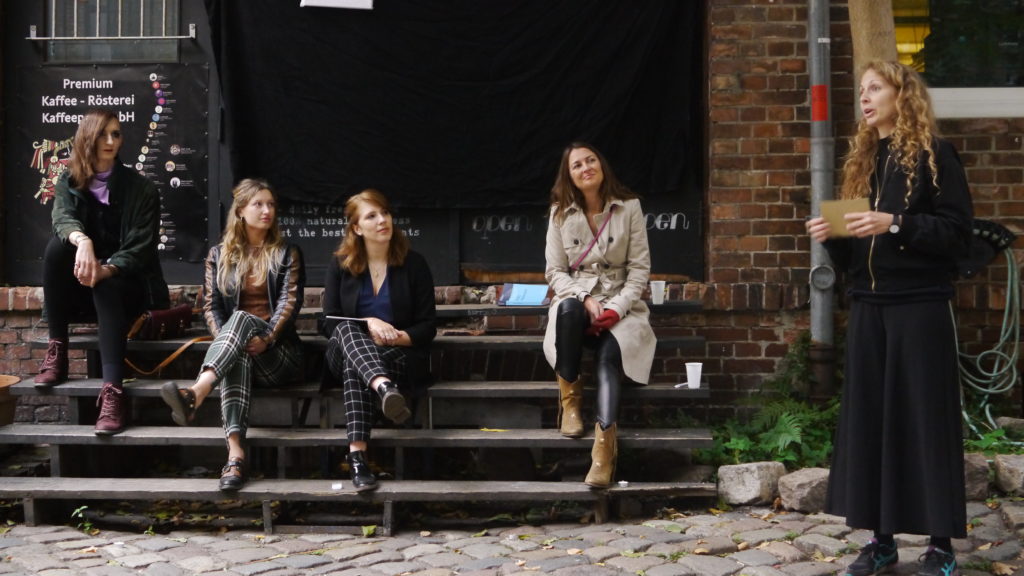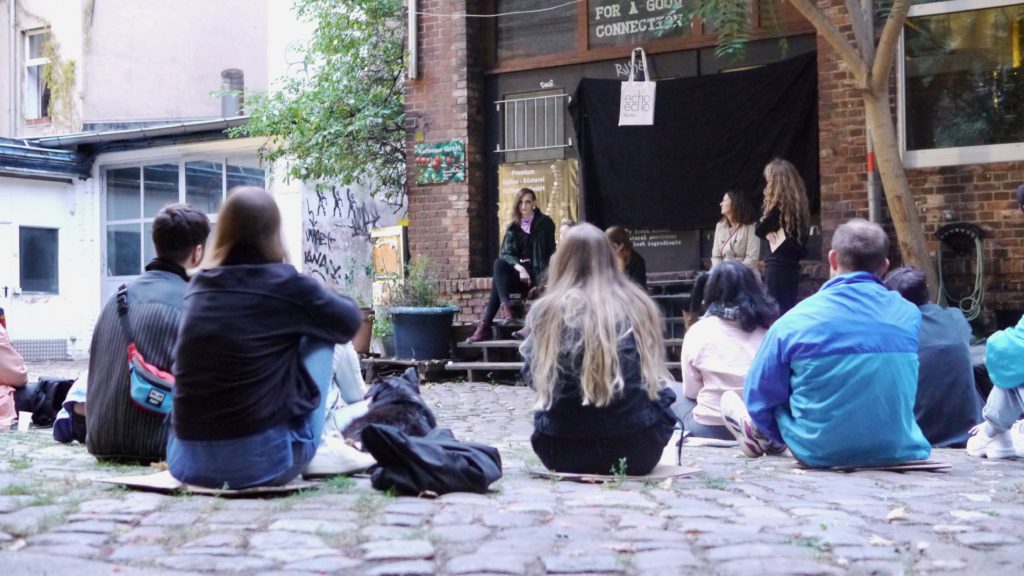(english version below)
26. Oktober 2021, ab 16 Uhr
Raum H3001 Hauptgebäude (H) der TU Berlin Straße des 17. Juni 135 10623 Berlin
Für den Nachwuchsförderungspreis der GMM in Kooperation mit der Most Wanted: Music 2021 (MW:M) suchen wir:
- laufende studentische Forschungsprojekte
- abgeschlossene Bachelorarbeiten und
- abgeschlossene Masterarbeiten
Die Projekte sollen sich mit musikwirtschaftlichen oder musikkulturellen Themen auseinandersetzen und dürfen nicht älter als 12 Monate ab Einsendung sein. Teilnehmen können Studierende und Absolvent*innen aller Deutschen Hochschulen und Universitäten.
Beispiele für Themen können sich im Themenkomplex von MW:M bewegen, sind jedoch nicht darauf beschränkt:
● Diversität in der Musikwirtschaft und Musikkultur, z.B. Rassismus, Geschlechterungleichheit, Klassismus, neue Strategien und Initiativen zur Förderung von Vielfalt und Empowerment, Vielfalt als Thema in Liedern
● Nachhaltigkeit in der Musikwirtschaft und Musikkultur z.B. ökologische Nachhaltigkeit, Nachhaltigkeit der Veranstaltungen, nachhaltige Lebensweisen von Künstler*innen
● Zukunft der Musik, z.B. Arbeiten zu neuen Genres, neuen Geschäftsmodellen und Strategien, neue Künstler*innensubjekte oder globale Musikphänomene, Trends und Entwicklungen
● Togetherness, z.B. gemeinsames Musizieren während und nach COVID-19, neue Formen und Praktiken der Zusammenarbeit, Veränderungen im gemeinsamen Musik-Erlebens, digitale Veranstaltungen der Musikwirtschaft
Bewerbt Euch bis zum 10.10.2021 mit einer Zusammenfassung (max. 1,5 Seiten) Eures Forschungs- oder Abschlussprojekts (Deutsch oder Englisch) und schickt diese per E-Mail an best-paper@musikwirtschaftsforschung.de. Wir wählen die besten Einreichungen aus, die dann auf der MW:M einer fachkundigen Jury und vor Publikum präsentiert werden. Die Präsentationen können auf Deutsch oder Englisch stattfinden. Je nach Pandemielage werden die Vorträge live oder per Zoom stattfinden, dies teilen wir noch rechtzeitig mit.
Preise: Die Gewinner*innen erhalten eine einjährige Mitgliedschaft in der GMM, über die sie an Aktivitäten der Musikwirtschafts- und Musikkulturforschung, sowie an Nachwuchsveranstaltungen, Forschungs- und Industrieworkshops und Fachausschüssen teilnehmen können. Darüber hinaus werden Preise für die Karriereentwicklung junger Forscher*innen vergeben. So erhält die beste Arbeit die Möglichkeit zur Publikation im Jahrbuch der GMM.
Fragen? Dann einfach eine Mail an: best-paper@musikwirtschaftsforschung.de
Über die GMM: Die Gesellschaft für Musikwirtschafts- und Musikkulturforschung untersucht aktuelle und historische Phänomene im Bereich der Musikwirtschaft und der Musikkultur und leistet hier insbesondere einen interdisziplinären Beitrag zur Forschung. Die GMM ist eine Plattform zum Austausch und zur Vernetzung von Wissenschaft und Praxis sowie von Nachwuchs und erfahrenen Expert*innen. Menschen aus Wissenschaft und Forschung sind bei der GMM genauso vertreten wie Praktiker*innen. Ein besonderer Schwerpunkt liegt auf der Förderung des wissenschaftlichen Nachwuchses. Die GMM interessiert sich dabei sowohl für Innovationen wie für fundierte Kritik im Bereich aktueller musikwirtschaftlicher und musikkultureller Praktiken und Diskurse. Sie legt Ihren Fokus auf kritische Einordnung von innovativen Entwicklungen und Positionen. Die GMM hat zum Ziel, eine der zentralen Gesellschaften an der Schnittstelle von Musikwirtschaft, Musikkultur und Forschung zu werden.
Zu unseren Aktivitäten zählen unter anderem:
- Matchmaking: Vermittlung von Expertise aus allen Bereichen von Musikwirtschaft und Musikkultur.
- Netzwerk: Vernetzung, Diskussion und Kooperation zwischen Wissenschaft, Kunst, Kritik und Praxis.
- Kooperationen: Wissenschaftliche Begleitung von Projekten, Prozessen und Teams.
- Wissenstransfer: Austausch zwischen Mitgliedern sowie nationalen und internationalen Netzwerken und Verbänden, zwischen Praxis, Forschung und Ausbildung.
- Ansprechpartner: Anlaufstelle für alle Fragen in und an die Musikwirtschafts- und Musikkulturforschung.
- Förderung: Nachwuchsförderung, Förderung der Disziplin.
- Veranstaltungen: Organisation von Panels, Workshops, Roundtables, Vorträgen.
- Publikationen: Herausgabe von Themenbänden, Jahrbüchern und Studien.
Call for Papers: GMM Best Paper Award
26 October 2021 – from 4 PM Location:
Technical University of Berlin
Main building – Room H3001 Straße des 17. Juni 135 10623 Berlin
The Young Research Award of the German Association for Music Business and Music Culture Research (GMM) in cooperation with the Most Wanted Music (MW:M) in Berlin, is looking for:
- students’ ongoing research projects
- completed Bachelor theses or
- completed Master theses
These projects should deal with topics of music business or music culture research and may not be older than 12 months from the date of submission. Students and graduates of all universities in Germany can take part in the award.
Examples of topics can be, but are not limited to, the themes of the MW:M:
● Diversity in music business and music culture e.g. racism, gender Inequality, classism, new strategies and initiatives to foster diversity and empowerment; diversity as a topic within songs
● Sustainability in music business and music culture e.g. ecological sustainability, sustainability of events, sustainable artist lifestyles
● Future of Music e.g works on new genres; new business models and strategies; new artist subjects; global music phenomena, trends and developments
● Togetherness e.g. making music together during COVID-19; new forms and practices of collaboration; changes in shared music experience; digital events
Please apply with a summary (max 1.5 pages) of your research or final project (in German or English) via e-mail to: best-paper@musikwirtschaftsforschung.de until 10/10/2021. We select the best submissions, which will be presented at the MW:M to an expert jury and in front of an
audience. The presentations can be in German or preferably in English. The event will take place live or online according to the actual COVID-10 regulations. We will inform the participants about the details via email.
Prizes: The winners will receive a one-year free GMM membership through which they will be able to participate in music business and music culture research activities, as well as junior events, research and industry workshops and specialist committees. It awards prizes for the career development of young researchers. Moreover, the best work will be published in the GMM Yearbook.
Further questions? Contact us via best-paper@musikwirtschaftsforschung.de
About the GMM: The Gesellschaft für Musikwirtschafts- und Musikkulturforschung (German Association for Music Business and Music Culture Research) examines current and historical phenomena in the field of music industry and music culture and, in particular, creates an interdisciplinary contribution to research. The GMM is a platform for exchange and networking of research and practice as well as young professionals and experienced experts. People from science and research are just as represented at GMM as practitioners. One of its special focuses is on the promotion of young scholars. The GMM is interested in innovations as well as sound criticism in the field of current music and music culture practices and discourses. It focuses on critical classification of innovative developments and positions. The aim of the GMM is to become one of the central associations for the intersection between music industry, music culture and research.
Our activities include:
- Matchmaking: providing expertise from all areas of the music industry and music culture.
- Network: networking, discussion and cooperation between research, art, criticism and practice.
- Cooperations: scientific support of projects, processes and teams.
- Knowledge transfer: exchange between members as well as national and international networks and associations.
- Contact person: for all questions in and on music industry and music culture research.
- Funding: promotion of young talents, promotion of disciplines.
- Events: Organization of panels, workshops, roundtables, lectures.
- Publications: Publication of theme books, yearbooks and studies.

